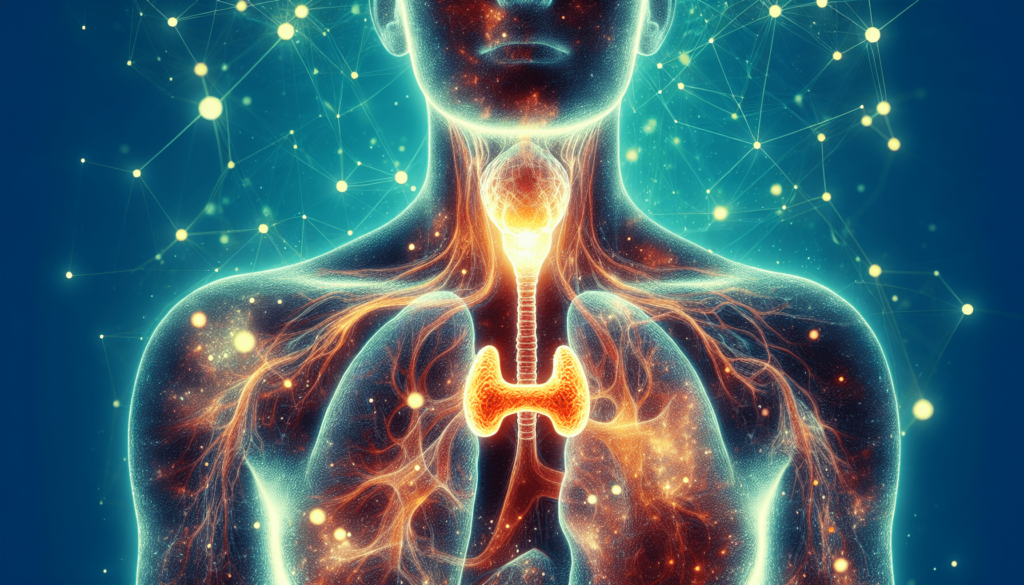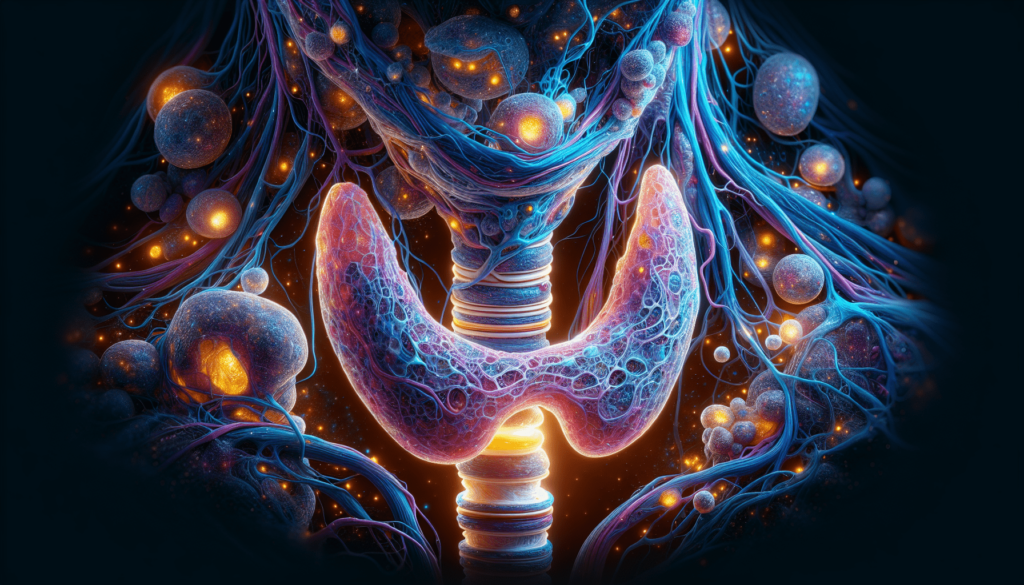Have you ever wondered how your body maintains balance, responds to stress, and processes everything from love to cravings for chocolate? The answer lies in tiny chemical messengers known as hormones that are part of a sophisticated system called the endocrine system. This system is like an internal orchestra, where each hormone plays its own unique instrument to create the symphony of your daily life.
Hormones are vital to our bodily functions, and understanding them can offer you insights into your health. They are much more than mere biological chemicals; they are the silent engineers behind every emotional and physical state you’ve experienced. In many ways, these tiny messengers are what allow you to feel like you.

What is the Endocrine System?
The endocrine system is a collection of glands that secrete hormones directly into your bloodstream. These hormones are responsible for regulating many of your body’s processes, including growth, metabolism, and mood. Think of the endocrine system as a complex communication network where the glands serve as the central post offices delivering messages throughout your body.
The Role of the Endocrine System
Table of Contents
Your endocrine system is pivotal in keeping your internal processes running smoothly. It ensures that your body maintains a state of homeostasis—an optimal balance where everything works as it should. Whether it’s in response to eating, sleeping, or experiencing stress, your endocrine system is hard at work sending hormones where they’re needed.
Components of the Endocrine System
The endocrine system comprises various glands, including the pituitary gland, thyroid gland, pancreas, adrenal glands, gonads, and more. Each gland has its own role and releases different hormones.
Understanding Hormones
Hormones are chemical messengers produced by the glands of the endocrine system. They travel through the bloodstream to tissues and organs, regulating bodily functions and influencing your physiology and behavior.
Types of Hormones
Hormones can be broadly categorized into three main types:
- Steroid Hormones: These are derived from cholesterol and include hormones like testosterone and estrogen.
- Peptide Hormones: Composed of amino acids, these include insulin and growth hormone.
- Amine Hormones: Derived from single amino acids, examples include adrenaline and thyroxine.
Understanding the types of hormones helps you appreciate how versatile and complex your endocrine system can be.
How Hormones Work
The mechanism by which hormones operate involves a blend of interaction, specificity, and timing. Hormones bind to specific receptors on the surface or inside of cells. This binding triggers responses that alter cellular activity, affecting various bodily functions.
The Crucial Seven: Hormones of the Endocrine System
Several hormones play pivotal roles in the endocrine system. Here are seven key hormones that you’ll find fascinating:
1. Insulin
Produced by the pancreas, insulin’s primary role is to lower blood glucose levels. When you eat, insulin helps cells absorb glucose for energy or storage, preventing blood sugar spikes.
2. Glucagon
Another hormone from the pancreas, glucagon performs the opposite action of insulin. It raises blood glucose levels by signaling the liver to release stored glucose. This balance with insulin is vital for maintaining energy levels and regulating blood sugar.
3. Cortisol
Cortisol, produced by the adrenal glands, helps control your body’s use of fats, proteins, and carbohydrates. It’s often called the stress hormone because levels spike in response to stress. However, its presence is crucial for numerous functions, including reducing inflammation and aiding your metabolism.
4. Adrenaline
This is your body’s “fight or flight” hormone, also produced by the adrenal glands. Adrenaline prepares your body to react quickly in stressful situations by increasing heart rate, expanding air passages of the lungs, and directing blood flow to major muscle groups.
5. Thyroid Hormones (T3 and T4)
Produced by the thyroid gland, these hormones play a key role in regulating metabolism, heart rate, and body temperature. They influence your energy levels and weight, making them integral to your daily life.
6. Growth Hormone
Released by the pituitary gland, growth hormone is essential for growth, cell repair, and metabolism. It helps maintain healthy tissues and organs throughout life, with its role being more pronounced in childhood.
7. Estrogen and Testosterone
While these hormones are often discussed in the context of sexual development and reproduction, they also contribute to bone health, mood regulation, and overall energy levels. Estrogen is primarily produced in the ovaries, while testosterone is produced in the testes.
The Benefits and Importance of Hormones
You might already notice that hormones are essentially your body’s internal communication network. Here’s how they benefit you:
Metabolic Regulation
Hormones coordinate a complex suite of chemical reactions that occur in your cells to provide energy. They ensure that just the right amount of energy is produced and consumed, which is vital for balanced bodily functions.
Growth and Development
Hormones play significant roles in your body’s development from childhood to adulthood. They direct everything from bone growth to brain development, orchestrating critical stages of your life.
Emotional Well-being
Certain hormones, like serotonin and dopamine, are directly linked to your mood and emotional health. A change in these hormone levels can significantly impact how you feel and react to the world around you.
Stress Response
The ability to manage stress relies heavily on your endocrine system. Hormones prepare you to either confront or flee a stressful situation and are instrumental in returning you to a state of calm afterward.
Maintaining Homeostasis
Your body is in a constant state of flux, adapting to changes in internal and external conditions. Hormones are the chief regulators maintaining balance, ensuring that everything functions optimally.

Looking into Common Hormonal Disorders
Despite their importance, the endocrine system can sometimes go awry. Hormonal imbalances can lead to various health issues, some of which are listed below:
Diabetes
This condition results from issues with insulin production or insulin action, leading to elevated blood sugar levels. Managing diabetes involves not just medicinal intervention but also lifestyle changes.
Thyroid Disorders
Conditions such as hypothyroidism and hyperthyroidism arise from either underactive or overactive thyroid glands, respectively. Symptoms can range from fatigue and weight changes to mood swings.
Adrenal Disorders
Adrenal inefficiencies can lead to both Addison’s disease and Cushing’s syndrome. If you experience extreme fatigue, changes in blood pressure, or unexplained weight changes, hormones might be the culprits.
Reproductive Hormone Disorders
Imbalances of estrogen or testosterone can affect reproductive health, influence mood, and disrupt normal bodily functions.
How to Maintain Hormonal Balance
A balanced lifestyle directly contributes to maintaining optimal hormone levels:
Nutrition
Focus on a balanced diet rich in whole foods. Nutrients, especially proteins, healthy fats, and fiber, are essential for hormone production and maintenance.
Exercise
Regular physical activity is a boon for balancing hormones. Exercise reduces insulin levels and increases insulin sensitivity, making it easier for your bloodstream to regulate sugars.
Stress Management
Since stress elevates cortisol levels, managing stress is crucial for hormone balance. Consider integrating practices like meditation, yoga, or deep-breathing exercises into your routine.
Sleep
Quality sleep is the foundation for good hormonal health. Poor sleep can disrupt hormone production, particularly those involved in stress management and metabolism.
Final Thoughts on Hormones
The world of hormones is as intricate as it is fascinating, intricately woven into the tapestry of your life. Their ability to impact growth, mood, metabolism, and stress response is profound. Understanding your endocrine system isn’t just an academic exercise—it’s key to appreciating how the tiny messengers inside you help harmonize your bodily functions and emotions, ultimately paving the way for a healthier and happier life.





